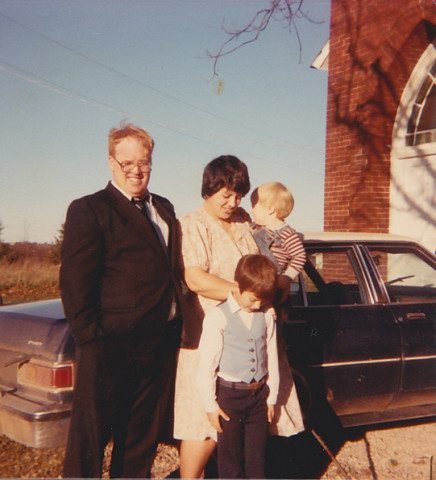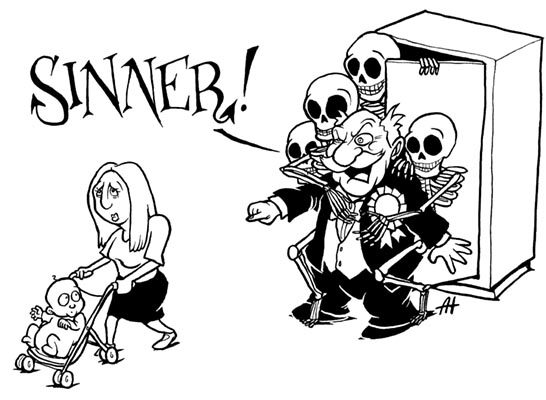
Several years ago, a grammar and spelling-challenged Evangelical man calling himself Doug Rowland sent me the following email:
I don’t know you neither have I heard of you . I just stumbled on this web-site . I know and you know that I know you are doing this for attention . You probley can’t preach very well and had no choice but to find something else to do . God is real and you know that there are no such thing as atheist and you are no acception .
Ah yes, a drive-by judgment of me as a person, my past, and why I continue to operate this blog. As an atheist, I have never, ever left such a comment on a Christian site. I consider such behavior childish, shallow, inconsiderate, rude, boorish, and quite humorous — as if by writing this email Rowland thought it would change me in any way. Not going to happen. If God can’t change me, the Doug Rowlands of the world have no chance. I am, and will remain until death, an atheist. Siccing God/Jesus/Holy Ghost/Local Evangelical preacher on me doesn’t work. I am a reprobate, one who has gone too far to turn back now. Of course, Rowland only read a couple of posts, so he likely doesn’t know these things. If he had done his homework, he might have decided not to send me this email. Or, perhaps, sending the email is all about him; a form of Evangelical masturbation; a feel-good exercise — I sure told THAT atheist! Regardless of Rowland’s motives, let me take a few moments to dissect his email.
I don’t know you neither have I heard of you.
You don’t know me and neither have you heard of me, yet your email suggests familiarity about what kind of man I am or was back in my preaching days. Do you make a habit of picking up strangers and having sex with them? Because, that’s what you are doing here. You made no effort to understand my story, choosing instead to read a few posts and then render what I am sure you think is God-inspired judgment.
For the record, I am actually quite well-known in some Evangelical circles. It’s uncommon for men with fifty years in the Christian church, including twenty-five years pastoring Evangelical churches, to walk away from everything and deconvert. It happens, but not very often. I suspect that the rarity of my deconversion is why so many Evangelicals are so hostile and caustic towards me. Unable to understand my story or fit it in their theological system, these servants of Jesus, instead, choose to attack my person, my character and, at times, my wife, children, and grandchildren. Every time this happens, I am reminded of how glad I am to be free from religious bondage.
I just stumbled on this web-site [sic].
Oh my God, I caused someone to stumble. Turn the light on, Doug, turn the light on!
I know and you know that I know you are doing this for attention.
Ah yes, another Evangelical mind reader who thinks he knows my “real” motivations for blogging; that the only reason I write is so people will pay attention to me. As with all writers, I do want my writing to be widely read, and I am grateful for the thousands of people who take the time to read what I have to say. In many ways, this blog is my church. The good news is that I can sit in my underwear, sip wine, and listen to Theory of a Deadman while I “preach” my sermons. Beats having to get all dressed up on Sunday and deliver a sermon that most hearers will ignore or forget by nightfall.
So, Doug is right. I write for attention, as all writers do. Who doesn’t want more readers, right? And preachers are no different. Who doesn’t want more congregants? Better to preach to a full house than an empty one.
I suspect Doug’s real motivation here is to impugn my character; to show that I am some sort of attention whore, or that I have no greater meaning or purpose other than whipping my penis out for all to see. I have long since stopped trying to convince people such as Doug otherwise. Believe what you will. How ’bout them Cowboys . . .
This blog, above all else, is one man telling his story. That’s how I started over ten years ago, and telling my story is still a prominent feature of this site today. Over the years, I have branched out a bit: Black Collar Crime Series, Sacrilegious Humor, Songs of Sacrilege, to name a few, but my desire remains the same: that through the telling of my story and critique of Evangelical Christianity, I help those who have doubts about Christianity or who have already left the Christian faith. My target audience has never been Christian zealots, people who are thoroughly committed to their beliefs. That’s why I don’t argue with or debate committed Evangelicals. They are free to read, comment, and move on. (Please see Comment Policy.)
You probley [sic] can’t preach very well and had no choice but to find something else to do.
Ah yes, the “real” reason I am no longer a pastor is that I couldn’t preach very well. Actually, according to people who heard me preach countless sermons, I was a very good public speaker. I worked hard on crafting my sermons, often spending days studying and writing them. I had a lot of failures as a pastor, but my preaching wasn’t one of them. I was passionate and thoughtful, especially as I got older. My goal was to get people to hear what I have to say and then act on it.
I was a full-time pastor, but I also worked outside of the church. All of the churches I pastored, save one, were comprised of middle-to-lower-income to poor people. The most I ever made in one year pastoring a church was $26,000. I pastored one church in southeast Ohio for eleven years. The most money I ever made in a year at that church was $12,000. I definitely was not in the ministry for the money. To help make ends meet, I worked outside of the church: managed restaurants, worked as a grant writer and building code inspector, sold insurance, pumped gas, worked as an auto mechanic, delivered newspapers, and worked as a stripper. 🙂
Of course, I never got to have an opportunity to see how much money I could make after I left the ministry. By then, I had been diagnosed with Fibromyalgia, and I have spent the last two and a half decades dealing with a plethora of health problems — which started, by the way, while I was still in the ministry, just in case an Evangelical reader is inclined to suggest that my debility is either God punishing me or trying to get my attention. (I was diagnosed with Fibromyalgia in 1997, eight years before I left the ministry.)
God is real and you know that there are [sic] no such thing as atheist and you are no acception [sic].
Doug believes there’s no such thing as an atheist; that deep down in their heart of hearts atheists KNOW there is a God; and not just any God, but the Evangelical God of the Protestant Christian Bible. When Christians take this tack with me, I often ask them to consider how they might feel if I belittled and denied their faith in Jesus. “Oh you are not a Christian. You know that there is no such thing as a Christian. You know in your heart of hearts that Allah is the one true God, and that all other Gods save him are false.” I suspect doing this would cause offense and anger, and rightly so.
When people tell me that they are Christian, I accept their statement at face value. In my world, it is good manners and respectful to accept people as they are; including how they self-identify. I just wish Christian zealots would grant atheists the same respect. When I say I believe, based on my studies and the extant evidence at hand, that there are no gods, there’s no reason whatsoever to not accept what I say at face value. It’s fine if you disagree with me or think I am headed for Hell. I have similar opinions about your beliefs. Getting along with each other requires we, at the very least, accept and understand the differences we have with others. This doesn’t mean we refrain from battling one another in the public square, but it does mean we allow each other to define our beliefs and label ourselves accordingly. Had Doug bothered to read more of my writing, he might have discovered that not only am I an atheist, I am also an agnostic, a humanist, and a democratic socialist. Unfortunately, many Evangelicals are lazy readers, choosing to render judgment after reading a few posts. Once they find out that I am an ex-preacher or an atheist, in their minds, that’s all they need to know. Judge Judy is ready to rule.
Doug, if you happen to stumble upon this post, I hope you will have learned a thing or two about the infamous ex-preacher-turned-atheist Bruce Gerencser. If you still have your head stuck in the sand, I encourage you to read the ABOUT and WHY pages. These two pages will go a long way in curing your ignorance. Above all, I hope you will accept me as a fellow human being; godless to the core, but human nonetheless. I know your beliefs and worldview preclude you from believing atheists are real, but rest assured we are. Our numbers grow daily, and we are no longer willing to let Evangelicals define for us who and what we are. I hope, in the future, you will make an honest effort to understand people such as myself. In doing so, you might find we have a few things in common.
Saved by Reason,

Bruce Gerencser, 68, lives in rural Northwest Ohio with his wife of 47 years. He and his wife have six grown children and sixteen grandchildren. Bruce pastored Evangelical churches for twenty-five years in Ohio, Texas, and Michigan. Bruce left the ministry in 2005, and in 2008 he left Christianity. Bruce is now a humanist and an atheist.
Your comments are welcome and appreciated. All first-time comments are moderated. Please read the commenting rules before commenting.
You can email Bruce via the Contact Form.





